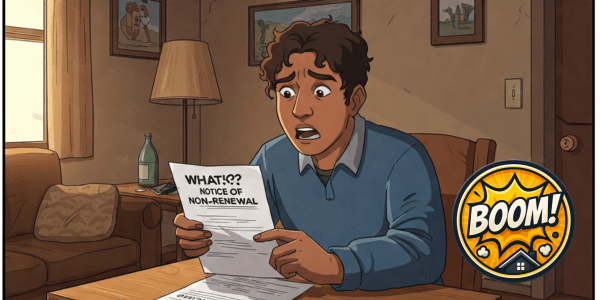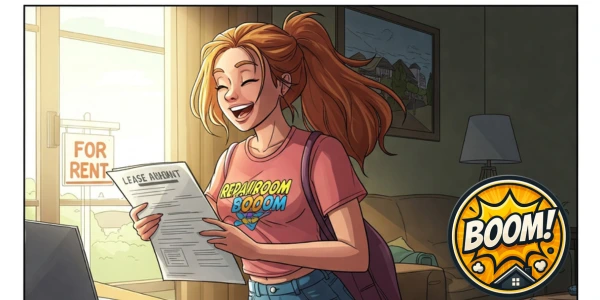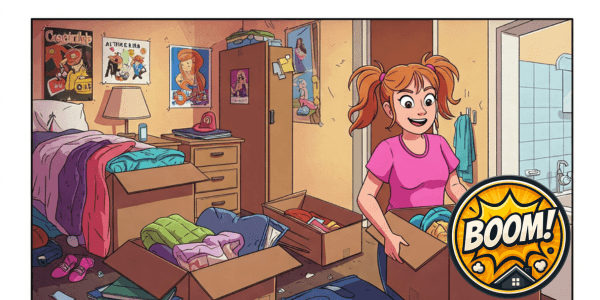Landlord not renewing lease

Introduction – Landlord not renewing lease
Receiving a notice that your landlord isn’t renewing your lease can be stressful. Does this mean you automatically have to move out? Not always. Your rights when a fixed-term lease ends vary significantly based on where you live. Understanding tenant rights when lease ends is crucial, but because landlord entry laws vary by state, and even city, you need to know what rules apply specifically to you. This article will cover general principles, detail California’s statewide rules and Santa Barbara’s stronger local protections as key examples, and guide you on how to find the laws that protect you, no matter where you rent in the U.S.
What Happens When a Fixed-Term Lease Ends?
A fixed-term lease has a specific end date. Unless the lease agreement contains an automatic renewal clause (less common in some areas), the lease itself simply expires on that date. At this point, one of a few things can happen:
- You move out according to the lease terms and state law.
- You and the landlord agree to sign a new fixed-term lease.
- You and the landlord agree to transition to a month-to-month tenancy.
- Without a new agreement or notice to terminate, your tenancy may automatically convert to a month-to-month arrangement under the original lease terms, as allowed by state law (this is common in California, for example).
- The landlord may serve you a notice of non-renewal landlord, indicating they want you to leave by the lease end date.
The question is: Can a landlord always choose option 5 without any specific reason, or do you have rights to stay? This is where state and local laws come in.
The Critical Role of State and Local Laws
While the basic concept of a lease ending applies everywhere, your protection against a landlord not renewing lease without cause depends heavily on your location. Many states and cities have passed laws requiring landlords to have a valid reason – known as “Just Cause Eviction” – to terminate a tenancy, even when a fixed lease term expires or during a month-to-month tenancy. Without just cause protection, in many places, a landlord can simply decide not to renew your fixed-term lease by giving proper notice. With just cause, they usually cannot.
Focus on California Law (Tenant Protection Act – AB 1482)
California offers significant statewide protection for many renters under the Tenant Protection Act of 2019 (AB 1482). While AB 1482 doesn’t force a landlord to offer a new lease contract, it drastically limits their ability to terminate a tenancy without just cause after a tenant has lived there for 12 months or more (or 24 months if additional adults joined the household later).
- Just Cause Requirement: If your property is covered by AB 1482, a landlord generally cannot issue a notice of non-renewal landlord CA unless they have one of the “just cause” reasons defined in the law. These include “at-fault” reasons (like non-payment of rent, violating lease terms) and “no-fault” reasons (like owner move-in, substantial remodeling – these often require relocation assistance).
- Notice Period: If a landlord does have just cause and wants you to leave at the end of your fixed term (or during month-to-month), they must provide a landlord notice to terminate lease CA, typically 60 days if you’ve lived there for a year or more.
- Rent Caps: AB 1482 also limits annual rent increases (5% + CPI, max 10%), requiring proper rent increase notice California.
Remember, AB 1482 has specific exemptions (building age, type of ownership, etc.), so not all rentals in California are covered.
Santa Barbara: A Strong Local Example
The City of Santa Barbara provides even stronger protections through its local Santa Barbara Rent Control and Santa Barbara Just Cause Eviction ordinances. These ordinances significantly impact Santa Barbara lease renewal laws:
- Stricter Just Cause: Santa Barbara’s ordinance requires landlords to have specific just cause reasons to terminate a tenancy, which can be stricter and have fewer exemptions than state law. This means a landlord generally cannot refuse to renew a fixed-term lease or terminate a month-to-month tenancy simply because the term is up or without cause, unless that cause is explicitly allowed and proven under the Santa Barbara ordinance. Tenants here have a robust right to continued occupancy unless there’s just cause as defined locally.
- Relocation Assistance: Santa Barbara’s ordinance mandates substantial relocation assistance payments for “no-fault” evictions.
- Local Rent Control: The city has its own rent control ordinance limiting annual increases, requiring specific rent increase notice Santa Barbara, and often providing stronger caps than state law.
Santa Barbara is a prime example of how local laws can add significant layers of protection beyond statewide rules, affecting a landlord’s ability to end a tenancy upon lease expiration.
If You’re Not in California (or Santa Barbara): What to Do
The most critical takeaway, no matter where you live in the U.S., is that landlord access laws state and local laws vary immensely. The rules in California or Santa Barbara may be completely different from those in New York, Texas, Illinois, or Florida.
- Check Your State Laws: Start by researching your state’s landlord-tenant laws. Look for information on lease termination notice requirements, what happens when a fixed lease ends, and whether your state has any form of statewide rent control or just cause eviction laws.
- Check Local Ordinances: Crucially, check the specific laws for your city or county. Many cities have their own rent control or just cause eviction ordinances that provide protections above and beyond state law. Look up your city’s municipal code or contact the city’s housing department.
- Consult Resources: Your local Legal Aid society, a tenant advocacy group, or a landlord-tenant attorney are excellent resources for understanding the specific laws in your area. [Link to: How to File a Complaint Against a Landlord] can also provide steps on seeking help.
What to Do When You Get a Non-Renewal Notice (Regardless of Location):
- Review the Notice: Check the date, the stated termination date, and ensure it complies with the notice period required by your state and local laws.
- Check Your Local Laws: Determine if your state or city has just cause eviction rules that apply to your property. If so, the landlord may need a valid legal reason to terminate your tenancy, even if the lease term is ending.
- Review Your Lease: Look for any clauses related to lease end or automatic renewal (though state/local law can override lease clauses).
- Communicate: Talk to your landlord. There might be a possibility of renewal or resolving the reason for non-renewal if one was given.
- Seek Help: If you believe the non-renewal is illegal or retaliatory [Link to: Landlord Won’t Make Repairs], contact a tenant advocacy group or legal counsel in your area immediately. In some cases, illegal non-renewal could be grounds to stay or seek damages.
Conclusion – Landlord not renewing lease
A landlord’s decision not to renew a lease isn’t always the final word on your tenancy. While the general principle is that fixed leases have an end date, tenant protections vary dramatically. California’s statewide AB 1482 provides significant just cause protection for many, and cities like Santa Barbara offer even stronger local ordinances.
Knowing your rights regarding lease renewals means understanding the specific landlord access laws and tenant protections in your state and your city. Don’t assume you have to move just because the lease is ending – check your local laws to know your rights.
fAQ – Landlord not renewing lease
Does a landlord have to have a reason to not renew a fixed-term lease?

Not necessarily in all locations. In areas without “Just Cause” eviction laws, landlords can often choose not to renew a lease by giving proper notice, without needing a specific reason. However, laws in states like California and many cities require “just cause” to terminate tenancy after a tenant has lived there for a certain period, even when a lease expires.
What happens to my tenancy in California if my fixed lease expires and I don’t sign a new one?

In California, if your fixed-term lease expires and you continue living in the property with the landlord’s permission (and neither party has given notice to terminate), your tenancy automatically converts to a month-to-month agreement under the same terms as the expired lease.
How does California’s AB 1482 affect a landlord’s ability to not renew a lease?

For many properties covered by AB 1482, landlords in California generally must have “just cause” (a valid reason listed in the law) to terminate a tenancy after a tenant has lived there for 12 months or more. This prevents them from simply issuing a non-renewal notice without cause at the end of a fixed term.
Are there special protections against lease non-renewal in Santa Barbara, CA?

Yes. The City of Santa Barbara has local ordinances, including a Just Cause Eviction ordinance, that provide stronger protections than statewide law. In Santa Barbara, landlords must adhere to specific, often stricter, “just cause” reasons defined by the city to terminate a tenancy or refuse to renew a lease, and they may also be required to pay relocation assistance for no-fault evictions.
How much notice must a landlord give if they are not renewing my lease?

The required notice period for lease non-renewal varies significantly by state and local law. In California, it’s typically 30 or 60 days, depending on how long you’ve been a tenant and if your property is subject to AB 1482 or a local ordinance like Santa Barbara’s. Always check the laws for your specific location.
What should I do if I receive a non-renewal notice?

First, review the notice and your lease. Second, immediately research your specific state and local landlord-tenant laws (checking for just cause eviction and notice requirements). If you believe the non-renewal violates your rights, communicate with your landlord in writing and seek assistance from a local tenant advocacy group or legal aid

How to replace a smoke alarm battery | Free Guide – RepairBoom
How to unclog a drain in 4 easy steps | Free Guide – RepairBoom
How To Fix A Sliding Closet Door In 3 Easy Steps
How to Get Your Security Deposit Back After Moving Out: In 4 Easy Steps


